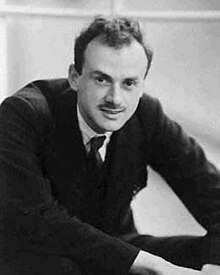Paul Dirac
| Paul Adrien Maurice Dirac | |||||||||||
|---|---|---|---|---|---|---|---|---|---|---|---|
 «A mí me enseñaron en la escuela que nunca se debe empezar una frase sin saber el final de la misma». |
|||||||||||
| Véase también | |||||||||||
| Esta página contiene citas de una persona fallecida hace 40 años. | |||||||||||
| Dependiendo de cómo se publicaran, pueden estar protegidas por derechos de autor. Deben usarse según las políticas de licencias de Wikiquote. | |||||||||||
Paul Adrien Maurice Dirac (n. Bristol, Inglaterra; 8 de agosto de 1902 - m. Tallahassee, Florida; 20 de octubre de 1984) fue un ingeniero eléctrico, matemático y físico británico pionero en la física cuántica de la Universidad de Cambridge. Fue Premio Nobel de Física en 1933.
Citas
[editar]- «Parece que uno de los rasgos fundamentales de la naturaleza es que las leyes físicas fundamentales se describen en términos de una teoría matemática de gran belleza y poder, para comprenderla se necesita una norma muy elevada de matemáticas... Uno quizás pudiera describir la situación diciendo que Dios es un matemático de orden muy elevado, y que Él usó matemática muy avanzada al construir el universo».
- Original: «It seems to be one of the fundamental features of nature that fundamental physical laws are described in terms of a mathematical theory of great beauty and power, needing quite a high standard of mathematics for one to understand it... One could perhaps describe the situation by saying that God is a mathematician of a very high order, and He used very advanced mathematics in constructing the universe». [1]
- «Me enseñaron en la escuela que nunca debes comenzar una oración sin saber el final».
- Original: «I was taught at school that you should never start a sentence without knowing the end of it». [2]
- «En ciencia uno intenta decir a la gente, en una manera en que todos lo puedan entender, algo que nunca nadie supo antes. La poesía es exactamente lo contrario».
- Original: «In science one tries to tell people, in such a way as to be understood by everyone, something that no one ever knew before. But in poetry, it's the exact opposite». [3]
- «Siento que la filosofía nunca llevará a descubrimientos importantes. Es solo una forma de hablar de los descubrimientos ya realizados».
- Original: «I feel that philosophy will never lead to important discoveries. It is just a way of talking about discoveries which have already been made». [4]
- "El único objetivo de la física teórica es calcular resultados que se puedan comparar con la experiencia ... Es totalmente innecesario que deba darse una descripción satisfactoria del curso completo de los fenómenos."[5]
Referencias
[editar]- ↑ The Tests of Time: Readings in the Development of Physical Theory. Editores Lisa M. Dolling, Arthur F. Gianelli, Glenn N. Statile. Edición ilustrada. Editor Princeton University Press, 2003. ISBN 9780691090856. p. 483.
- ↑ [https://books.google.es/books?id=1Pg7t9a_AX4C&pg=PA45&dq=I+was+taught+in+school+that+you+should+never+start+a+sentence+without+knowing+the+end+of+it.+Paul+Dirac&hl=es&sa=X&ved=0ahUKEwjH7fix-dzgAhWp34UKHX4xCwQQ6AEIKzAA#v=onepage&q=I%20was%20taught%20in%20school%20that%20you%20should%20never%20start%20a%20sentence%20without%20knowing%20the%20end%20of%20it.%20Paul%20Dirac&f=false Paul Adrien Maurice Dirac: Reminiscences about a Great Physicist. Editores Behram N. Kursunoglu, Eugene Paul Wigner. Edición ilustrada, reimpresa. Editorial Cambridge University Press, 1990. ISBN 9780521386883. p. 45.
- ↑ [https://books.google.es/books?id=NUkNBQAAQBAJ&pg=PA98&dq=In+science+you+try+to+tell+people,+in+a+way+that+everyone+can+understand,+something+that+nobody+ever+knew+before.+The+poetry+is+exactly+the+opposite.+Paul+Dirac&hl=es&sa=X&ved=0ahUKEwiPh7ah-tzgAhXpSxUIHefbCmkQ6AEIKDAA#v=onepage&q=In%20science%20you%20try%20to%20tell%20people%2C%20in%20a%20way%20that%20everyone%20can%20understand%2C%20something%20that%20nobody%20ever%20knew%20before.%20The%20poetry%20is%20exactly%20the%20opposite.%20Paul%20Dirac&f=false Mounce, Robert H. So They Say. Editorial Wipf and Stock Publishers, 2014. ISBN 9781498201667- p- 98.
- ↑ [https://books.google.es/books?id=1NaUZYIj8okC&pg=PA58&dq=Philosophy+is+just+a+way+of+talking+about+the+discoveries+that+have+already+been+made.+Paul+Dirac&hl=es&sa=X&ved=0ahUKEwjI7KeG-9zgAhWMxoUKHf3TB5YQ6AEIKDAA#v=onepage&q=Philosophy%20is%20just%20a%20way%20of%20talking%20about%20the%20discoveries%20that%20have%20already%20been%20made.%20Paul%20Dirac&f=false Beller, Mara. Quantum Dialogue: The Making of a Revolution. Science and Its Conceptual Foundations series. Edición ilustrada. Editorial University of Chicago Press, 2001. ISBN 9780226041827. p. 58.
- ↑ Paul A. M. Dirac: The Principles of Quantum Mechanics (1930), 7.
